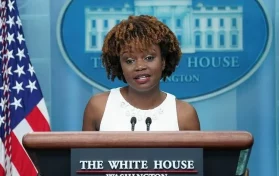
Late Friday, the Eighth U.S. Circuit Court of Appeals issued a temporary block on President Joe Biden’s student debt bailout plan. The ruling came just one day after a judge had dismissed a lawsuit brought by the Attorneys General of six Republican-led states that challenged the program.
The 8th District Appellate Court granted an emergency stay, which bars the discharge of any student loan debt while the court works through an injunction request on the program. The emergency stay also allows for the original decision of the dismissal to be appealed.
The appellate court, which is based out of the St. Louis, MO area, also ordered the injunction and appeal to go forward in an “expedited briefing schedule.”
On Thursday, the initial lawsuit was dismissed by U.S. District Judge Henry Autrey, who said that the six AGs “lacked the necessary legal standing to pursue the case.” Autrey did say, however, that the lawsuit “raised important and significant challenges to the debt relief plan.”
Many legal scholars have said that the manner by which President Biden issued the student debt relief, via executive order, was not legally sound. Most agree that Congress should have taken up the issue if the Democratic Party wanted to grant this type of debt relief to Americans.
This idea is the crux of the case brought by Attorneys General from Missouri, South Carolina, Nebraska, Kansas, Iowa and Arkansas. They contend that “Biden’s plan skirted Congressional authority.” The suit also claimed that the states involved would see a loss of future tax revenue and other monies earned in state organizations that either service student loans or invest in them.
One of Joe Biden’s campaign promises was to offer student debt relief, and in September, he announced that he’d signed an executive order to that effect. Biden said he was able to use an executive order due to the pandemic. However, less than one month later, Biden told a 60 Minutes reporter that the pandemic was over.
Within days, the White House had walked back that comment, as the statement could add substance to any lawsuits brought about regarding student debt relief.
In September, the Congressional Budget Office, a non-partisan economic policy organization, said that student debt relief would eventually cost the government $400 billion (there are those who believe the total might be closer to $500 billion).
On Friday, White House Press Secretary Karine Jean-Pierre said that while the stay is in effect, borrowers can still go online and put in their application for relief. Jean-Pierre went further to say that the administration can still view the applications and get any approved applicants ready to send the relief to loan servicers.
Jean-Pierre added that 22 million Americans had already gone through the application process, and she encouraged people to continue applying if they had not already done so.
“It is important to note that the order does not reverse the trial court’s dismissal of the case or suggest that the case has merit. It merely prevents debt from being discharged until the court makes a decision,” remarked Jean-Pierre.
One of the Attorneys General working on the case, Nebraska AG Doug Peterson, offered positive comments about the appellate court’s decision: “It’s very important that the legal issues involving presidential power be analyzed by the court before transferring over $400 billion in debt to American taxpayers.”
The lawsuit led by Peterson isn’t the only one challenging the Biden Administration’s student debt relief plan. The Brown County Taxpayers Association, based out of Wisconsin, has also filed suit regarding the legality of the student debt relief plan. The Wisconsin case came before Supreme Court Justice Amy Coney Barrett, who would deny an emergency request by the group to put the debt relief plan on hold. Barrett’s decision came with no explanation.
Democrats have hoped that the student debt forgiveness program would help to bolster Democratic candidates in the upcoming midterm elections.





